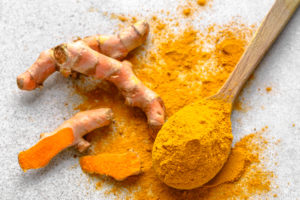Various natural agents have come into view as having a potential role in reducing risk of severe covid symptoms, addressing covid symptoms, and addressing long covid issues. One of these is Curcuma long root, aka turmeric, aka curcumin.
Common signs and symptoms of COVID-19 include fever, dry cough, congestion, sore throat and tiredness. More severe presentations might include difficulty breathing, chest pain, and hypoxia and even more severe and life threatening or life ending for some including respiratory distress syndrome (ARDS), covid pneumonia, total organ failure, and death.
Many mechanisms, pathogenesis and issues of altered immune response are yet to be fully answered.
While we have quite effective vaccines, public health measures and medications to improve outcomes, we must admit, we still have the short end of the stick. Thus it behooves us to be open minded about other possibilities for effective treatment options.
 Curcumin is the main bioactive constituent of turmeric root. The current systematic review assessed the effects of curcumin on outcome measures in patients with mild, moderate, and severe forms of Covid-19. Outcome measures included symptoms, mortality, and inflammatory markers.
Curcumin is the main bioactive constituent of turmeric root. The current systematic review assessed the effects of curcumin on outcome measures in patients with mild, moderate, and severe forms of Covid-19. Outcome measures included symptoms, mortality, and inflammatory markers.
Studies that were included in this systematic review were randomized or non-randomized controlled trials (RCTs), randomized crossover studies, or cluster-randomized trials with patients aged 18 to 85 years diagnosed with COVID-19. A Covid 19 PCR test or imaging findings were used to determine diagnosis. Patients with mild to severe disease were included.
There were 108 original articles identified and six met all eligibility criteria. Five of those were double-blind RCTs and one was non-randomized. All articles were of good quality.
When comparing the intervention groups to placebo, all six studies showed significantly faster resolution of symptoms with the intervention in areas including faster recovery from cough, chills, myalgia and taste and smell problems. The lymphocyte counts also significantly increased at a faster rate in curcumin groups compared to placebo. One study showed that the oxygen saturation was significantly higher after one week and at discharge from clinical care when compared to placebo.
One study of a nano-curcumin product showed reduction in fever, cough, and shortness of breath when compared to placebo. Two studies showed significant reductions in shortness of breath and another showed reduction in shortness of breath and hospitalization.
Mortality rate was reported in four studies with one study reporting four out of 20 patients in the intervention group and eight out of 20 in placebo. Another study reported zero in 20 in the curcumin group and one in 20 in placebo. There was also evidence in that same study that patients with severe covid-19 had a one in 20 mortality rate with curcumin vs. five of 20 in the placebo group. One RCT showed no deaths in mild and moderate COVID-19 in the curcumin groups compared with one in 30 patients in the mild control group and five in 25 patients in the moderate control group. In addition, in that same study, there were two deaths in 15 patients in the curcumin group and five in 15 patients in placebo for those patients with severe COVID-19.
Numerous markers of inflammation and immune response were consistently better in the curcumin group than the placebo group.
Commentary: All of these studies were small and different formulations and doses of curcumin were used. None the less, one would have to ask, why not try it? Why not use it in addition to any other medication a practitioner might recommend? One can easily look up cautions and contraindications for this plant along with other medications. Improving symptoms, shortening duration, reducing mortality and restoring an optimal inflammatory response are goals of all Covid 19 interventions. If you are not already familiar, I encourage you to look at other natural medicine resources on this subject, including the I-MASK protocols for prevention, early intervention, adjunct hospital and recovery from the FLCCC (Front Line Covid-19 CritiCaL Care aLLianCe Prevention & treatment ProtoCoLs For Covid-19). I do not agree with everything they assert, but I think they have some good information for the role of quercetin, zinc, vitamin C and melatonin. The authors of the curcumin systematic review conclude that curcumin treatment as an adjunct therapy may help restore a balanced inflammatory response. As well, curcumin supplementation may reduce severity of common COVID-19 symptoms including mortality. The authors reiterate that further studies are needed using standardized and well-characterized preparations of curcumin-related compounds and large sample sizes to include outpatients, in-hospital, and post-COVID-19 settings to determine efficacy and safety.
Majeed M. is the founder of Sami-Sabinsa group of companies. Banach M. serves on the speaker’s bureau, is a consultant, and received grants from supporting companies. All remaining authors declare no conflicts of interest
Reference: Vahedian-Azimi A, Abbasifard M, Rahimi-Bashar F, et al. Effectiveness of curcumin on outcomes of hospitalized COVID-19 patients: A systematic review of clinical trials. Nutrients. January 2022;14(2):256.

